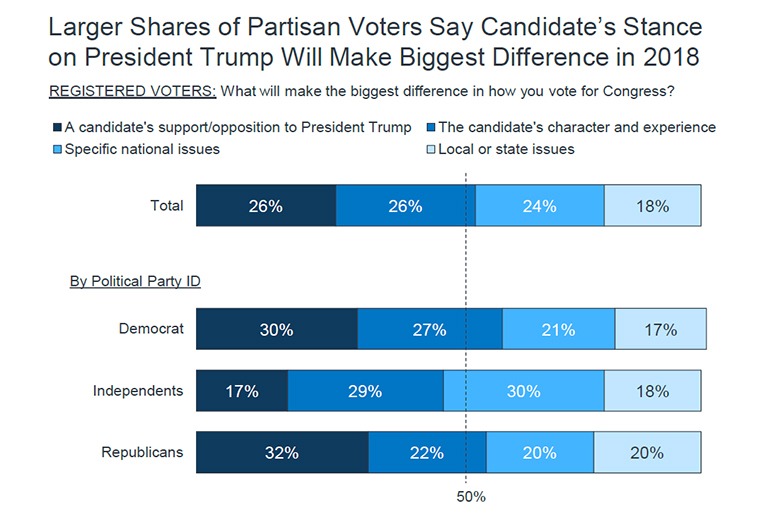Voters looking toward the midterm elections are more motivated by a candidate’s stance on President Donald Trump than on any specific policy question.
But concerns about prescription drug prices and other health care costs still could greatly influence how people cast their ballots, according to a poll by the Kaiser Family Foundation released Thursday. (Kaiser Health News is an editorially independent program of the foundation.)
Almost a third of Republicans and 30 percent of Democrats said a candidate’s support of or opposition to the president will have the biggest impact on their vote. Even among voters who said health care is the most important issue for 2018, 28 percent said they will vote based on the candidate’s viewpoints of the president.
Meanwhile, 45 percent of Democratic voters said they are more enthusiastic to vote in this congressional election than in the past compared with three in 10 Republicans, but this enthusiasm was not attached to any specific issue.
“We can talk about all the different issues that are going to be playing out in the midterms, but it seems like this election is going to be based on the public’s approval or disapproval of Trump,” said Ashley Kirzinger, a senior survey analyst for KFF’s public opinion and survey research team.
On the issue of prescription drugs, 66 percent of Republicans, 78 percent of Democrats and 72 percent of independents said they would be “more likely” to vote for a candidate vowing to bring down costs.
“Lowering prescription drug prices has been and will continue to be extremely popular, regardless of political ideology,” said Alex Lawson, the executive director of Social Security Works, a group that advocates for lower drug prices, among other things.
That tracks with other KFF polling this year that shows high drug prices seem to be one thing on which Americans agree, regardless of party affiliation. In that earlier survey, 8 in 10 people said drug prices are too high, and a majority of both Democrats and Republicans thought the pharmaceutical industry has too much power.
On the campaign trail, Trump talked about pharmaceutical companies “getting away with murder” and vowed to lower prices.
“He has used the right rhetoric for a while on drug prices, but the yawning chasm between his rhetoric and literally putting pharmaceutical executives in charge seems insurmountable to me,” Lawson said.
A highly anticipated policy speech by Trump on prescription drug costs, which was originally scheduled for late April, is now, according to Health and Human Services Secretary Alex Azar, slated for Friday.
More broadly, cost concerns appear to be a top issue for many voters. When asked in the most recent KFF poll “to say in their own words” the health policy issues they would like 2018 candidates to take on, lowering health care and insurance costs drew similar large majorities from people in both parties.
The issue has become less ideological, Kirzinger said. When the conversation shifts from Obamacare to the cost of health care, people from both sides come together more.
“In previous election cycles we’ve seen when health care plays a role, it’s a little about cost, but for Republicans it’s about repealing the ACA,” she said. “That argument has somewhat dissipated … it’s really about cost this election.”
In general, 22 percent of registered voters said they wanted to hear about health care policies from congressional candidates, ranking just behind the economy and jobs. But when asked to name just one issue that they want to hear about in the campaign, just 12 percent said health care.
Thirty percent of Democrats, 15 percent of Republicans and 19 percent of independents say it is the “most important” thing for a candidate to talk about on the campaign trail.
Of the voters who say they care about health care, about 60 percent are either Democrats or Democratic-leaning independents, so it could likely play a bigger role in Democratic primaries than for Republicans.
A partisan divide remains regarding the Affordable Care Act. Just under half of the public, and 79 percent of Democrats, hold a favorable view of the sweeping health law known as Obamacare. But a near mirror image of Republicans — 79 percent — view it unfavorably.
The poll was conducted April 20-30 among a nationally representative telephone sample of 2,000 adults. The margin of sampling error is +/-3 percentage points for the full sample.
This story was produced by Kaiser Health News, an editorially independent program of the Kaiser Family Foundation.
